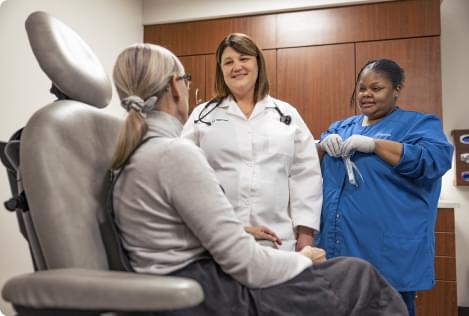| Study Name | Description Sort ascending | Trial Category | Trial SubCategory |
|---|---|---|---|
| S1806 | The purpose to this study is to look at the effectiveness of adding atezolizumab to chemo and radiation. You must be diagnosed with muscle invasive bladder cancer. You cannot have already received chemo or radiation. | Cancer | Bladder |
| NRG-GI008 | The purpose of this study to use blood draws looking at the tumor DNA in the blood to determine need for chemotherapy. You must be diagnosed with stage 3 colon cancer. | Cancer | Colon |
| NRG-BR009 | The purpose of this study is treat breast cancer after surgery. You must have estrogen positive breast cancer and an oncotype score ≤25. This study looks at adding chemotherapy to the standard treatment of ovarian function suppression and aromatase inhibitor. | Cancer | Breast |
| A032103 | The purpose of this study is to use central DNA testing to monitor recurrance in patients with urothelial cancer. You must have had a radical cysectomy and lymph node dissection with no evidence of residual cancer. | Cancer | Urothelial |
| A151216 (ALCHEMIST) | The purpose of this study is to send tissue for screening of mutations to find targeted therapy for your cancer. You must be diagnosed with stage 1B, stage 2 or stage 3A resectable or completely resected non-small cell lung cancer (NSCLC). | Cancer | Non-Small Cell Lung |
| Librexia ACS | The purpose of this study is to see if an experimental drug, called milvexian is safe, effective and useful in reducing risk of developing blood clots, stroke, or another heart attack among subjects with a recent heart attack or angina (chest pain) episode. An experimental drug is one that is not approved by the United States Food and Drug Administration (FDA). | Heart & Vascular | Atrial Fibrillation |
| S2107 | The purpose of this study is to see if adding immunotherpy to chemo is more effective than chemo alone. You must be diagnosed with metastatic colorectal cancer. | Cancer | Metastatic Colorectal |
| EA2176 | The purpose of this study is to see if adding immunotherpy to chemo is more effective than chemo alone. You must be diagnosed with metastatic anal cancer. | Cancer | Metastic Anal |
| EAY191-A6 ComboMATCH | The purpose of this study is to see if adding Binimetinib in combination with FOLFOX is more effective treatment. You must be diagnosed with biliary tract cancer with a MAPK pathway gene mutation. | Cancer | Biliary |
| NRG-GI005 | The purpose of this study is to look at the tumor DNA with blood draws to determine risk of cancer recurrance. You must be diagnosed with Stage 2A colon cancer. | Cancer | Colon |
| A022104 | The purpose of this study is to look at the effectiveness of two chemo regimens mFOLFOX6 or CAPOX vs mFOLFIRINOX in getting patients to remission. You must be diagnosed with stage 2 or 3 rectal cancer. | Cancer | Rectal |
| NRG-GI004 | The purpose of this study is to look at the effectiveness of Atezolizumab alone or in combination with other chemo regimens. You must be diagnosed with metastatic colorectal cancer with a DNA mismatch repair deficiency and BRAF gene mutation. | Cancer | Metastatic Colorectal |
| A031702 | The purpose of this study is to look at the effectineness of cabozantinib combined with nivolumab and ipilimubmab. You must be diagnosed with a rare genitourinary tumor of the kidney, bladder, ureters or penis. | Cancer | Rare Genitourinary |
| Bayer ON-TRK | The purpose of this study is to learn about the effectiveness of Vitrakvi in patients with TRK Fusion cancer. You must have a advanced solid tumor with a NTRK gene fusion. | Cancer | All tumor types |
| Intuitive Surgical Ureter | The purpose of this study is to investigate whether the study drug may allow the surgeon to better see the ureters when using the da Vinci Surgical System for gynecological surgery. | Surgery | Gynecology |
| Rethink Reflux Registry | The purpose of this study is to gather information about how the LINX device works over an extended period in people with GERD (gastric esophageal reflux disease). | Surgery | GERD (Gastro Esophageal Reflux Disease) |
| EAY191 ComboMATCH | The purpose of this study is to find targeted therapy for specific gene mutations in metastatic or advanced cancer. You must have progressed on standard of care treatment or have a cancer which has no standard of care treatment. If select mutations are found you may be eligible for a sub-study. | Cancer | Genomics |
| Iocyte Faraday STEMI drug | The purpose of this study is to evaluate the efficacy and safety of the study drug vs placebo in subjects with an anterior ST-elevation myocardial infarction (STEMI) undergoing primary percutaneous coronary intervention (pPCI). | Heart & Vascular | Heart Failure |
| A022101 | The purpose of this study is to evaluate radiation, ablation and surgery. You must be diagnosed with metastatic colorectal cancer. The primary tumor must be able to surgically resected. | Cancer | Colorectal |
| A031902 | The purpose of this study is to evaluate progression free survival and overall survival with the use of enzalutamide and rucaparib vs enzalutamide alone. You must be diagnosed with metastatic castration-resistant prostate cancer. This must be your first treatment for your metastatic cancer. | Cancer | Metastatic Prostate |
| EA5163 | The purpose of this study is to evaluate overall survival using immunotherapy alone or in combination with chemotherapy in advanced non-squamous Non-Small Cell Lung Cancer (NSCLC). You must be diagnosed with stage 4 Non-Small Cell Lung Cancer (NSCLC). | Cancer | Non-Small Cell Lung |
| Complete TAVR | The purpose of this study is to determine whether restoring blood flow to all blocked or narrowed arteries via percutaneous coronary intervention (PCI) using coronary stents is better than treating the coronary artery disease (CAD) with medications in patients with CAD who had successful transcatheter aortic value replacement (TAVR) with a balloon expandable heart valve. The study will also compare measurements of hemodynamics (blood flow and blood pressure) that are taken during on-table procedures (TAVR and PCI) with those taken by echocardiography (heart ultrasound). | Heart & Vascular | Cardiovascular Disease |
| EAA181 | The purpose of this study is to determine what consolidation regimen is most effective. Patients cannot get stem cell transplant until first relapse or later. You must have newly diagnosed multiple myeloma (MM). | Cancer | Multiple Myeloma |
| S1922 | The purpose of this study is to determine the effectiveness of Ramucirumab and Paclitaxel vs Folfiri chemo. You must be diagnosed with metastatic or unresectable small bowel cancer. | Cancer | Small Bowel |
| EAY191-S3 ComboMATCH | The purpose of this study is to determine the effectiveness of Paclitaxel and Ipatasertib in patients who progressed within 6 months of taxane-based therapy. You must have a a AKT-Altered cancer. You must have a locally advanced, unresectable or metastatic cancer. | Cancer | Solid Tumors (non-breast) |
| S2001 | The purpose of this study is to determine the effectiveness of Olaparib + Prembrolizumab vs Olaparib alone. You must be diagnosed with metastatic pancreatic cancer with a BRCA1 or BRCA2 mutation. | Cancer | Pancreatic |
| EAY191-E4 ComboMATCH | The purpose of this study is to determine the effectiveness of nilotinib and paclitaxel in patients with prior taxane treated solid tumors. You must have had at least one prior line of therapy in the metastatic setting. | Cancer | Solid Tumors |
| A031803 | The purpose of this study is to determine the effectiveness of intravesical gemcitabine in combination with prembrolizumab. Patients must have been diagnosed with invasive bladder and already received chemo. | Cancer | Bladder |
| A082002 | The purpose of this study is to determine in SBRT (stereotactic body radiation therapy) improves survival in advanced stage NSCLC. You must be diagnosed with stage 3 or 4 Non-Small Cell Lung Cancer (NSCLC). | Cancer | Non-Small Cell Lung |
| NRG-GU009 | The purpose of this study is to determine if it is effective to use your genomic risk to determine the level of treatment you need. Those with a lower genomic risk get a de-intensified treatment and those with a higher risk get a intensified treatment. You must be diagnosed with high-risk prostate cancer. | Cancer | Prostate |
Unsupported Browser! This website will offer limited functionality in this browser. We only support the recent versions of major browsers like Chrome, Firefox, Safari, and Edge.


